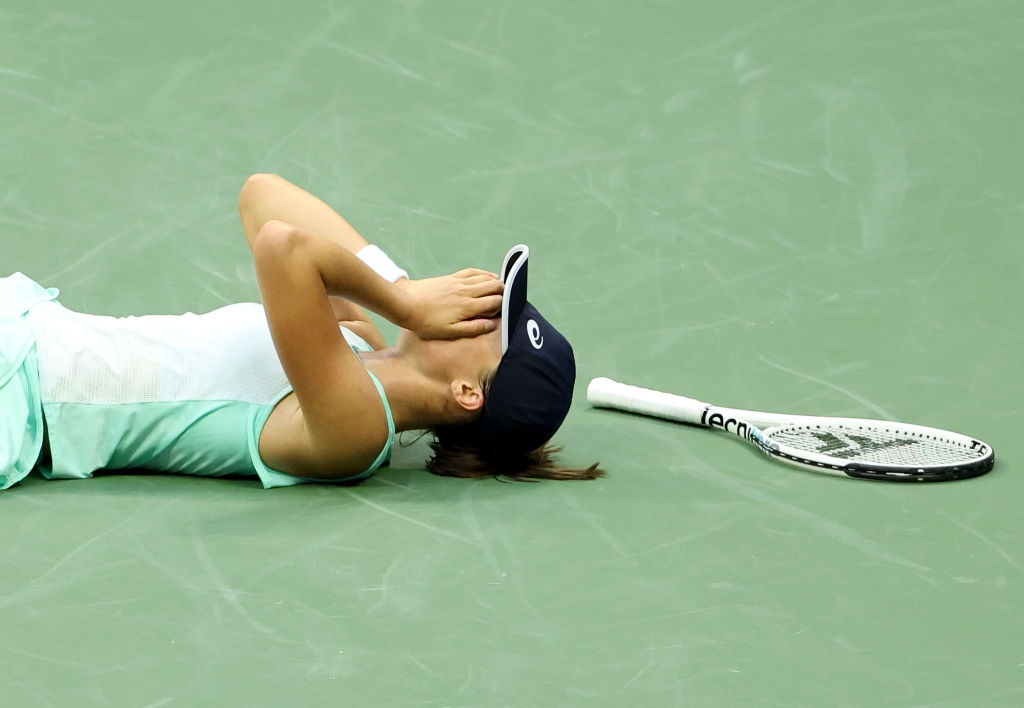FLUSHING, N.Y. — This is the terrifying bit, for the rest of the field: It's unclear if Iga Swiatek ever got comfortable at this U.S. Open en route to winning it on Saturday. Before it started, she talked about how she didn't like the balls used here. While it was happening, she often lapsed into sloppy tennis, most conspicuously when she went down a set and a break in her fourth-round match. She swapped out her rackets constantly, as late as championship point. And after it was over, with her third major trophy sitting on the table in front of her, she said she still wasn't quite at home: "Here on Ashe, I still need to figure out the atmosphere. I wasn't sure before the match if this is actually my place." What does her career look like once she's figured everything out? How does one substantively improve on being the best player in the world, by a massive margin, at age 21? Guess we'll find out.
Rankings points don't capture every nuance of good form, but they do offer a convenient measure of the gulf between Swiatek and the rest of the women's tour. Her coach, Tomasz Wiktorowski, said Saturday that they had been gunning for 10,000 points, an audacious goal that no one except Serena Williams and Ash Barty has met in the seasons since 2013. And next week Swiatek will clock in at 10,365. In second place is Ons Jabeur, the Open runner-up, with under half of that sum, 5,090. "No one wants to let her with her intensity pull away from our level, we always want to keep her close," Jabeur said after the match, though that will remain a trying task as Swiatek, a quick study who solved hard courts in a single season, puzzles out the rest of the game, too.
It was satisfying that the two best players in the world met in the year's last major final, even if the 6-2, 7-6(5) score still underlined the difference between the two. The top seed sped to the lead and while Jabeur broke back with luminous passage of shot-making at 3-1, she clamped down on the set and opened the second with an immediate break. Jabeur's gift is her feel, and when she's in the right mood her racquet moves through the ball like water. But the flatter winners required to pierce through Swiatek's court coverage proved difficult to keep inside the court. That's still the correct game plan, though, and it's one she'll likely stick to in future encounters; afterwards she said her only regret was her serving. The serve kicked in at the very end, neutralizing a match point and carrying her into a tiebreak, where, after some visibly nervous play—including a Swiatek first serve that floated at least 10 feet long, and several unforced errors on routine balls from both players—the best player alive prevailed.
All year Swiatek proved that she could overcome her naturally passive tendencies and force the issue against the aggressive players that thrive on the WTA. This has paid serious dividends, including a 57-7 season record, seven titles, and a $2.6 million check on Saturday ("I'm really glad it's not in cash"). Though Iga claims to dread the days before finals, she never fails to deliver on court the next day, posting a career 10-1 record in title fights, having only lost her first-ever in 2019. She is already one of the most flexible and mobile players around, able to dig low balls out from a half-crouch or full-tilt slide. She has still more room to develop with her serve and net touch. She's developing a clay season stranglehold that would make her idol Rafa Nadal proud. She's a guaranteed Hall of Famer by the letter of the law. If she hasn't hit double-digit majors within five years, I'd be as shocked as she was when she popped the lid on her first U.S. Open trophy and found a block of tiramisu.
!!!!! pic.twitter.com/87PMt0TfDe
— Out of Context Iga Świątek (@SwiatekOOC) September 11, 2022





